

Melissa
Making time to support literacy in a crowded role: teacher librarians leading reading engagement in schools — National Education Summit. When I visited 30 school libraries in 2018 as part of a research project that looked at school libraries as a literacy resource, I was amazed by the complexity of the current teacher librarian role.
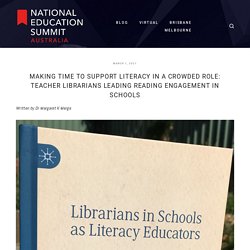
I was already familiar with the evidence guides for teacher librarians which highlight some of the diverse facets of the role. However when I spoke to teacher librarians about what they do as part of their regular routine, it became clear that you have a chameleon-like role to play in your schools. While this enables you to meet many of your school’s needs, I was concerned that it could be hard for you to have time to support literacy learning given the challenges you face.
Assessing Learning Without a Test. If you teach in a high school setting, it seems natural that after students learn, you assess, but does assessing always mean giving tests? When I was in school, the answer was yes. However, we can challenge our students far more than any test can because tests are often meant to have students regurgitate information they have learned and don’t allow them to insightfully connect with and reflect on a text. Digital Multimedia Reading Response. Inspiring inquiry through picture books. — KATH MURDOCH. "The bridge will only take you halfway there, to those mysterious lands you long to see.
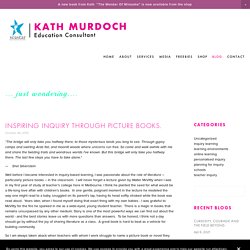
Through gypsy camps and swirling Arab fair, and moonlit woods where unicorns run free. So come and walk awhile with me and share the twisting trails and wondrous worlds I've known.
EdShed. Australian authors for children. Libraries as Literacy Leaders — National Education Summit. Literacy is one of the core goals of education, and school libraries are uniquely positioned to provide leadership in literacy promotion to their educational community. Literacy features prominently in many schools’ educational planning, however, the school library may not explicitly be part of the literacy strategy. Research shows that student engagement with recreational literacy or reading for pleasure peaks at the end of primary school and drops off over the high school years (Cullinan 2000), (National Literacy Trust, 2020). These are also the years when students are required to engage with increasingly complex reading and writing tasks.
Reading for pleasure is consistently linked to improved literacy outcomes (Krashen, 2004), (National Literacy Trust, 2006), and is a key component of fostering literate, capable students. Reading fiction books has been shown to give higher literacy gains than other forms of reading (Jerrim and Moss 2018). Ipswich District Teacher Librarian Network. Resources Literature > Documents >
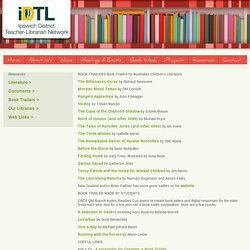
Library and Information Science Encyclopedia. Library and Information Science Encyclopedia is an Online Encyclopedia of Library and Information Sciences.
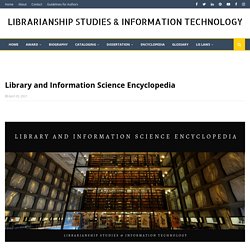
It provides articles on librarianship studies, library science, information science, information technology, information and knowledge organization, and management. The encyclopaedia includes articles on everything from traditional library terms to a vocabulary of modern avenues in information science and technology. Encyclopedia articles will include anything and everything required for an advanced study and reference on the Library and Information Science (LIS) topics, including biographies of famous librarians. Library and Information Science Encyclopedia, which is currently under development, is envisioned to become an authoritative source for consultation and reference for any library or information profession related issue and a treasure hub of knowledge on Library and Information Science, which is open and free for all the library professionals worldwide.
Arlene G. American Association of School Librarians. The Evolution of Bloom’s Taxonomy and How it Applies to Teachers Today – Instructional Design By Kelly. The Original Bloom’s Taxonomy In 1956, and educational psychologist Benjamin Bloom developed a tool that teachers could use to develop a structure and an understanding of how students think (Churches, 2016).
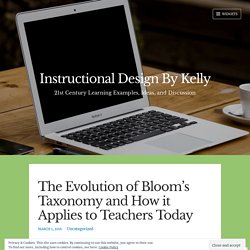
It has been a very popular and useful tool for many years.
Busy with books. Dewey genrefied. Digital life. Leadership. Math and Literacy. Organisations. Science. Writing texts for different purposes. House of Representatives Committees – ee schoollibraries report chapter1.htm. | House of Representatives Education and Employment Navigation: Previous Page | Contents | Next Page ...the school library is the school’s physical and virtual learning commons where inquiry, thinking, imagination, discovery, and creativity are central to students’ information-to–knowledge journey, and to their personal, social and cultural growth...[1] ‘Who was one of the people who inspired my love of reading?
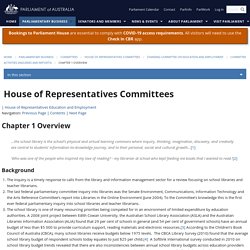
Ten Reasons Libraries Are Still Better Than the Internet. By Marcus Banks | December 19, 2017 “Thanks to the internet, we no longer need libraries or librarians.”
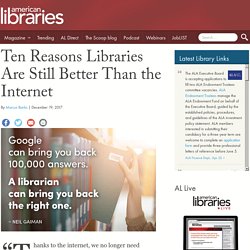
You most likely hear some variation on that theme pretty regularly. Sixteen years ago, American Libraries published Mark Y. Foundation Knowledge, Skills and Attributes relevant to Information Professionals working in Archives, Libraries and Records Management. Adopted 2014.
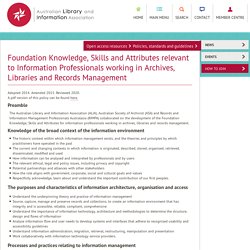
Amended 2015. Reviewed 2020. A pdf version of this policy can be found here. Preamble The Australian Library and Information Association (ALIA), Australian Society of Archivist (ASA) and Records and Information Management Professionals Australasia (RIMPA) collaborated on the development of the Foundation Knowledge, Skills and Attributes for information professionals working in archives, libraries and records management.
What works best: 2020 update. What works best: 2020 update (PDF, 1.6MB) Access our other 'What works best' resources This paper is an update to our 2014 publication.
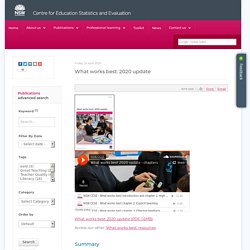
The 2020 update outlines eight quality teaching practices that are known to support school improvement and enhance the learning outcomes of our students. The themes are not an exhaustive list of effective practices, but are a useful framework for teachers and school leaders to consider when deciding how to tackle student improvement. The eight themes identified as likely to make the biggest difference to our students are: The library as 'third space' in your school. Beyond day to day service provision, the teaching of information and digital literacy skills and resource transactions, the school library is often a ‘safe space’ for our students and even our staff (teaching and administration).
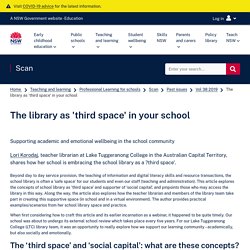
This article explores the concepts of school library as ‘third space’ and supporter of ‘social capital’, and pinpoints those who may access the library in this way. Along the way, the article also explores how the teacher librarian and members of the library team take part in creating this supportive space (in school and in a virtual environment).
The author provides practical examples/scenarios from her school library space and practice. When first considering how to craft this article and its earlier incarnation as a webinar, it happened to be quite timely. Our school was about to undergo its external school review which takes place every five years. The School Library Media Specialist. A school is a learning community. Each teacher and child comes with a unique set of experiences that contribute to the community of learning. The school library media center offers a wide variety of resources and opportunities. Once upon a time: a brief history of children's literature. April 2 is International Children’s Book Day and the anniversary of the birth of one of the most famous contributors to this genre, Hans Christian Andersen.
But when Andersen wrote his works, the genre of children’s literature was not an established field as we recognise today. Adults have been writing for children (a broad definition of what we might call children’s literature) in many forms for centuries. Little of it looks much fun to us now. Neil Gaiman: Why our future depends on libraries, reading and daydreaming. It’s important for people to tell you what side they are on and why, and whether they might be biased. A declaration of members’ interests, of a sort. So, I am going to be talking to you about reading. I’m going to tell you that libraries are important. I’m going to suggest that reading fiction, that reading for pleasure, is one of the most important things one can do.
I’m going to make an impassioned plea for people to understand what libraries and librarians are, and to preserve both of these things. Sophisticated picture books. World of Westfahl Reference: Series Fiction. BookSeriesInOrder.com - Book Series in Order. Finding Their Story: Navigate the World. Your library. Oliver guided tours. Addressing selection criteria. Facebook. Breaking Barriers, Building Bridges: Critical Discussion of Social Issues. Finding Their Story: Navigate the World. Inspiring inquiry through picture books. — KATH MURDOCH. 10 Ways to Boost Literacy Using Audiobooks in the Classroom. Taking Student Responses Digital.